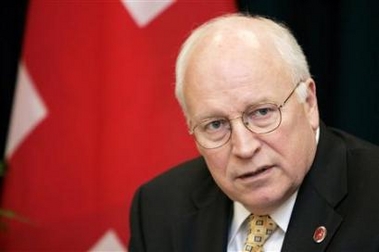Dick Cheney strongly critical of the Kremlin marks the start of a new Cold
War that could drive Moscow away from its new-found Western allies, the Russian
press said on Friday.

U.S. Vice President
Dick Cheney meets with Georgian President Mikheil Saakashvili (not
pictured) after delivering a speech during the Vilnius Conference 2006 in
Vilnius, Lithuania, May 4, 2006. A speech by Cheney strongly critical of
the Kremlin marks the start of a new Cold War that could drive Moscow away
from its new-found Western allies, the Russian press said on may 5.
[Reuters] |
In shocked reaction to the harshest U.S. criticism of Moscow for years,
commentators said Washington had created an anti-Russian cordon of
Western-aligned states stretching from the Baltic almost to the Caspian Sea.
The Kremlin, in a reaction within hours of Cheney's delivery in Vilnius, said
the speech, which was full of accusations that Moscow was limiting human rights
and using its energy riches to blackmail the world, was "completely
incomprehensible."
The Russian press compared it to a 1946 speech by British statesman Winston
Churchill in Fulton, Missouri, when he said an "Iron Curtain" was dividing
eastern Europe from the free world.
"Enemy at the Gates. Dick Cheney made a Fulton speech in Vilnius," said
business daily Kommersant's front page headline.
"Vice President Dick Cheney made a keynote speech on relations between the
West and Russia in which he practically established the start of the second Cold
War ... The Cold War has restarted, only now the front lines have shifted," it
said.
Washington and Moscow have largely ignored differences since the hijacked
airliner attacks on U.S. buildings in September 11, 2001 and concentrated on
joint interests in the wars against international militant groups.
But ties between the former superpower rivals have cooled in recent months.
The harsh criticism by Cheney injected fresh tension that is likely to be
still felt when Russian President
President Bush and other world leaders
at a summit of the G8 club of rich nations in St Petersburg in July.
Commentators said the speech was an answer to Russia's increased
self-confidence, which has stemmed from high oil prices and a shortage of energy
supplies giving it new global influence.
Cheney was speaking in the Lithuanian capital at a meeting of former
communist satellites. The group included ex-Soviet states Ukraine, Georgia and
Moldova which have infuriated their former master by turning toward the West.
Komsomolskaya Pravda (KP), Russia's top-selling daily, showed what the
meeting meant to Moscow by coloring in the states that met in Vilnius to show a
purple cordon separating Russia from the rest of Europe.
Reaching for another historical analogy, it compared the meeting to that
between the anti-Nazi allies Churchill, Franklin D. Roosevelt and Josef Stalin
in the Soviet town of Yalta in 1945, at which they divided up the map of Europe.
"Yesterday in the Lithuanian capital of Vilnius, like in Yalta in 1945, the
map of Europe was redrawn," KP said, raising the specter of Russia being
isolated from the mainstream.
"What can Russia do? It would appear it will have to strengthen ties with
Belarus and Central Asia. And get close to China, to balance this Western
might."
Commentators said Russia was being expected to knuckle under and follow the
U.S. lead.
"We are being asked to deny ourselves and take orders from those who know
better and will decide everything for us," said official daily Rossiiskaya
Gazeta in a lengthy commentary.
"At the same time, Moscow's partners are not prepared to sacrifice anything,
keeping their "correct" patriotism and their own policies."